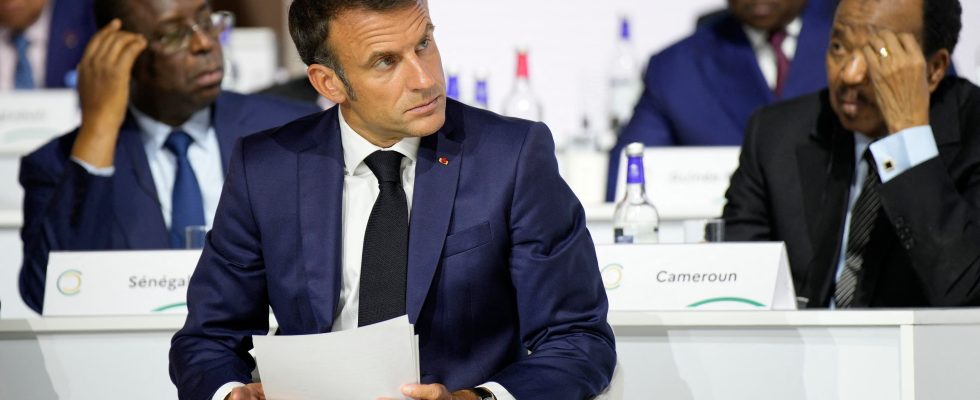Dollars but no revolution: the two-day summit hosted by France ended on Friday June 23 with some progress in favor of poor countries but without yet materializing the Big Bang hoped for to redirect global finance in the service of the climate.
Closing the two-day summit, Emmanuel Macron welcomed a “complete consensus” to “reform in depth” the global financial system. But the meeting ended with a series of small steps and immediately without the great joint declaration hoped for for a time by the French presidency.
A clause suspending debt payment in the event of a disaster
Paris welcomed again this Friday, June 23 some forty heads of state and government, including the Brazilian Lula and the Saudi Mohammed ben Salmane, in a meeting supposed to concretize ideas born at the last COP, in Egypt, before the next one, in the United Arab Emirates at the end of the year. In a Palais Brongniart, former headquarters of the Paris Stock Exchange, judged by several participants to be ill-suited by its location and its cramped conditions, a few announcements were made.
The World Bank thus plans to include a new clause suspending debt payment in the event of a disaster in its agreements with the most vulnerable countries. Mia Mottley, Prime Minister of Barbados, had been pushing for months to transform the financial system with such a clause in particular. “It’s a good day, because almost everyone has accepted the validity of the natural disaster clauses,” jubilant the leader in an interview with AFP Thursday evening before a big concert for the climate in front of the Eiffel Tower.
The new president of the World Bank Ajay Banga has announced new instruments in international aid, including the possibility of “providing a pause in debt repayment, so that countries can focus on what matters”. An important step for countries facing natural disasters with dramatic consequences, linked to climate change.
No consensus on an international tax on maritime transport
“We are in favor of an international tax on maritime transport because it is a sector that is not taxed”, also said Emmanuel Macron, who would like to see this question advanced at a future meeting of the Maritime Organization. international (IMO). But this thorny question still seems far from reaching a consensus. “If China, the United States and several key European countries which also have large companies involved do not follow us, then you put a tax in place but it has no effect”, regretted Emmanuel Macron.
In a long passionate tirade, Brazilian President Luiz Inacio Lula da Silva for his part deplored pell-mell the inertia of the international community in the fight against climate change and the reduction of inequalities, as well as the protectionism of Westerners. He sharply criticized the international financial institutions: “he who is rich is always rich and he who is poor is always poor.”
Aid to Senegal, debt restructuring for Zambia
The summit made some further progress on Thursday, however. A group of rich countries and development banks have pledged to mobilize 2.5 billion euros to help Senegal reduce its dependence on fossil fuels, particularly heavy fuel oil.
Zambia will see its debt reduced, an announcement hailed in Lusaka, where parliamentarians sang the national anthem to mark their joy. The creditor countries of this southern African state, notably China, have agreed to restructure 6.3 billion dollars of debt. Zambia is in debt to the tune of 32.8 billion dollars, including 18.6 billion with foreign creditors, according to figures from its Ministry of Finance at the end of 2002.
The Managing Director of the International Monetary Fund (IMF), Kristalina Georgieva, wanted to show that things had changed, announcing that the reallocation to poor countries has reached 100 billion dollars of special drawing rights (SDR), a kind of currency IMF reserve. “It is the future of humanity that is being discussed here,” said Kristalina Georgieva.
Disappointment of NGOs
The international NGO network Climate Action Network (CAN), however, criticized a summit “which made new out of old” and criticized the idea of a possible suspension of repayments “rather than a complete cancellation of the debt”. The ambitions of the summit are based “too much on private investment and assign an excessive role to multilateral development banks”, thus regretted Harjeet Singh, head of CAN. “It ignores the pivotal role that public finances must play.”
“We cannot ask leaders to mobilize and at the same time totally condemn” the current summit, said Soraya Fettih, spokesperson for the environmental association 350.org. “What is clear is that this summit will not lead to any binding and strong decisions,” she said during a demonstration on Friday. More than 350 people gathered at the foot of the Statue of the Republic in Paris on Friday morning, with environmental activists turning giant black dollars into green dollars to urge political leaders to stop investing in fossil fuels and switch to green finance.
